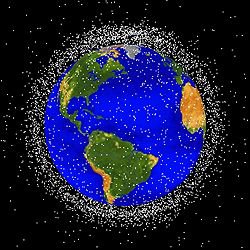11.03.2005
Space Junk Code of Conduct
 Orbital debris is always a hot space law topic. Human-made orbiting junk can seriously harm people and property in space. As researchers warn, depending on altitude, some of today's debris can orbit for hundreds or thousands of years. And any debris reentering the atmosphere that doesn't burn up can do damage on the Earth’s surface. You don't want to be standing there.
Orbital debris is always a hot space law topic. Human-made orbiting junk can seriously harm people and property in space. As researchers warn, depending on altitude, some of today's debris can orbit for hundreds or thousands of years. And any debris reentering the atmosphere that doesn't burn up can do damage on the Earth’s surface. You don't want to be standing there.In the American Journal of International Law (July 2005), Steve A. Mirmina, NASA Senior Attorney, International Law Practice Team offers an interesting view on what to do about the ever-increasing peril of orbital junk, Reducing the Proliferation of Orbital Debris: Alternatives to a Legally Binding Instrument.
Steve overviews the threat posed by an estimated two million kilograms of junk orbiting within two thousand kilometers of the Earth’s surface at a velocity of approximately ten kilometers per second.
He looks at three options for tackling the problem: "(1) a voluntary adherence regime modeled loosely on the Missile Technology Control Regime (MTCR); (2) a United Nations–centered approach; and (3) a voluntary code of conduct."
After considering the pros and cons of each of these approaches, Steve recommends a voluntary code that "can later be transformed into legally binding obligations."
Between July 19 and 30, 1999, the Third United Nations Conference on the Exploration and Peaceful Uses of Outer Space (UNISPACE III) took place in Vienna, Austria. For four days the International Institute of Space Law coordinated the “Workshop on Space Law in the Twentyfirst Century” with the participation of more than 130 experts on outer space law from around the world. The workshop reached an unequivocal conclusion with regard to debris: “There is a need to have at least a code of conduct concerning space debris.” For numerous reasons a code of conduct might be the best solution to reduce orbital debris in the immediate term. First, it would not require waiting for the agreement of states at the international level—a key difference between this option and the first two approaches suggested (the voluntary adherence regime and the UN-based approach). A code of conduct on orbital debris can be created in the absence of state action, at the initiative of space agencies or private operators active in outer space, and can introduce “best practices” against which state practice can later be measured.
I think this option has great merit, and as Steve explains, there is precedent in the space arena for voluntary codes of conduct. Read the whole article.
(Note: Steve Mirmina, who served on the U.S. delegation to the Scientific and Technical and Legal Subcommittees of the UN Committee on the Peaceful Uses of Outer Space, expresses his own views here, not necessarily those of NASA or the US. By the way, congratulations again to Steve on his world champion space law moot court team!)






